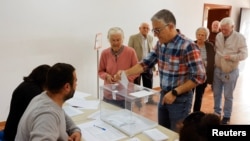Spanish voters head to the polls on Sunday in regional and municipal elections, the results of which will serve as a barometer for an end-of-year general election.
Voting is taking place in 12 regions and 8,000 towns and cities, most currently run by the governing Socialist Party (PSOE). Polls are predicting gains for the conservative People's Party (PP), which if replicated later in the year could unseat the current left-wing coalition.
Voting opened at 9 a.m. (0700 GMT) and will close at 8 p.m. Over 35 million people are eligible to vote.
Campaigning has been marked by several controversies, from allegations of voter fraud in small towns to an unprecedented case of kidnapping.
Races will be tight in many areas, with few clear majorities, election polls and experts predict, except in the region of Madrid, where regional president Isabel Diaz Ayuso of the PP could win re-election with an absolute majority.
Some polls suggest a close race in the Valencia region, which with a population of almost 5 million would represent a major setback for the PSOE. Aragon and the Balearic Islands could also swing to the PP, according to polls.
The elections may also mark the beginning of a return to a two-party system dominated by the PSOE and PP after a decade of greater involvement for smaller parties such as the left-wing Podemos, the government's junior partner, and centrist Ciudadanos. Both may struggle to reach the 5% vote to qualify for representation in many regions.
On the other hand, the PP will likely have to rely on the far-right Vox to form governments in several regions, in a possible precursor to a right-wing coalition government after the general election.





